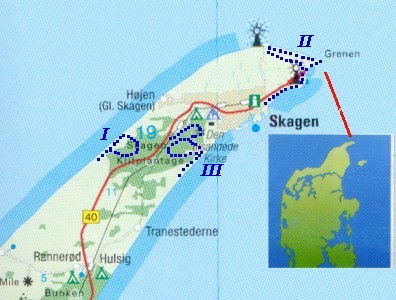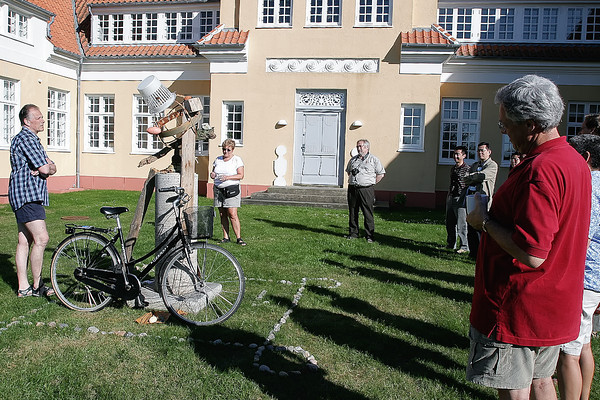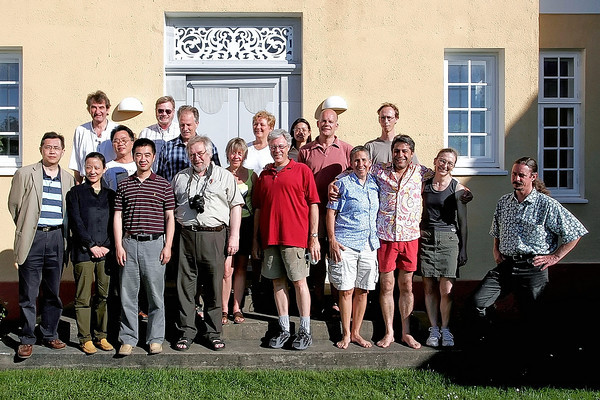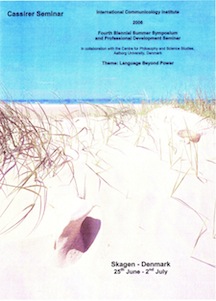
 SUMMER CONFERENCE ON COMMUNICOLOGY
SUMMER CONFERENCE ON COMMUNICOLOGY
 SUMMER CONFERENCE ON COMMUNICOLOGY
SUMMER CONFERENCE ON COMMUNICOLOGY
 The ICI in cooperation with a co-sponsoring institution holds a periodic Summer Conference featuring a Research Symposium and Professional Development Seminar. In general, the Conference alternates between a venue in the United States of America and an international venue. It is typical for the sponsoring institution, usually a university or research center, to underwrite the primary cost of the meeting venue. The conferences are by invitation only. Fellows and Scholars must provide their own travel and lodging costs, usually through their home institutions. The Summer Conference has three parts: (1) Formal papers presented by Fellows and Scholars under an organized theme as a Symposium, published later in book form, (2) a Seminar of cognate papers concerned with pedagogy and research in Communicology, and (3) a Colloquy of informal discussions and dialogues among Fellows, Scholars, and locally invited participants focused on issues raised both in the Symposium and the Seminar; these discussions are for purposes of professional development. Certificates of Participation are issued upon completion of the conference.
The ICI in cooperation with a co-sponsoring institution holds a periodic Summer Conference featuring a Research Symposium and Professional Development Seminar. In general, the Conference alternates between a venue in the United States of America and an international venue. It is typical for the sponsoring institution, usually a university or research center, to underwrite the primary cost of the meeting venue. The conferences are by invitation only. Fellows and Scholars must provide their own travel and lodging costs, usually through their home institutions. The Summer Conference has three parts: (1) Formal papers presented by Fellows and Scholars under an organized theme as a Symposium, published later in book form, (2) a Seminar of cognate papers concerned with pedagogy and research in Communicology, and (3) a Colloquy of informal discussions and dialogues among Fellows, Scholars, and locally invited participants focused on issues raised both in the Symposium and the Seminar; these discussions are for purposes of professional development. Certificates of Participation are issued upon completion of the conference.
 Sponsoring Universities:
Sponsoring Universities:
 2000 — USA
2000 — USA
Southern Illinois University, Department of Speech Communication, Carbondale, Illinois.
 2002 — CANADA
2002 — CANADA
Brock University, Center for Teaching, Learning, and Educational Technology, St. Catharines, Ontario.
 2004 — USA
2004 — USA
Bemidji State University, Department of Theatre and Communication Arts, Bimidji, Minnesota.
 2006 — DENMARK
2006 — DENMARK
Aalborg University, Centre for Philosophy and Science Studies, Aalborg.
 2011 — POLAND
2011 — POLAND
Department of Linguistic Semiotics and Communicology, Philological School of Higher Education, Wrocław.
 2013 — USA
2013 — USA
Department of Communication & Rhetorical Studies, Duquesne University, Pittsburgh.
 PAST INTERNATIONAL SYMPOSIA
PAST INTERNATIONAL SYMPOSIA
 2000 First Summer Symposium U.S.A. (Carbondale, Illinois)
2000 First Summer Symposium U.S.A. (Carbondale, Illinois)
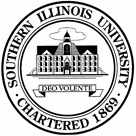
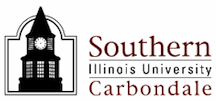
Southern Illinois University 12 June to 7 July 2000
"Communicology as a Human Science: Course and Conference"
Conference Organizer: Richard L. Lanigan
The Course: Communicology as a Human Science
SPCM 503-301 (3 cr. hrs; registration PIN = 02883)
Four Week Class: June 12 to July 7, 2000
Meets M-Tu-W-Th-F from 1:20 to 3:20 in Room 1020, Communications Building
Catalogue Description:
Introduction to the human science approach (phenomenology) to theory construction in human communication. Examination of the modality conditions for evidence (actuality, possibility, necessity, sufficiency) and the corresponding logics (asserotic, problematic, apodeicitic, thematic) for qualitative research. Focus on Abduction models of human communication and practice as used by such theorists as Gregory Bateson, Paul Watzlawick, Roman Jakobson, Charles S. Peirce, Maurice Merleau-Ponty, and Michel Foucault.
Seminar Texts:
James A. Anderson (1996). Communication Theory: Epistemological Foundations (New York, NY: Guilford Press).
Julia Kristeva (1989). Language the Unknown: An Invitation to Linguistics (New York, NY: Columbia University Press).
Richard L. Lanigan (1988). Phenomenology of Communication (Pittsburgh, PA: Duquesne University Press).
Richard L. Lanigan (1992). The Human Science of Communicology (Pittsburgh, PA: Duquesne University Press).
Jean-Francois Lyotard (1991). Phenomenology (Albany, NY: State University of New York Press).
Donald Polkinghorne (1983). Methodology for the Human Sciences: Systems of Inquiry (Albany, NY: State University of New York Press).
The Conference: Communicology
Four Weekly Sessions: June 12 to July 7, 2000
Meets M-Tu-W-Th-F from 1:20 to 3:20 in Room 1020, Communications Building
Program Description:
Ph.D. alumni from the Department of Speech Communication whose research methodology is semiotic phenomenology have a continuing dialogue about their research and publications. This dialogue was recently innovated to the internet medium with the creation of the "Communicology Conference" on the COW (Conferencing on the Web). This interactive WWW distance learning site allows interactive dialogue, including a record of discussion for new users to review, plus articles on line. This is a professional closed conference site with peer reviewed entry to maximize dialogue relevance to research on topic. Graduate students registering for SPCM 503 will be added to the user list for site access. Alumni are invited to attend one or more weeks of the conference dialogue on campus at SIU. Several alumni will be participating in the campus conference as part of professional development grants from their universities. All alumni are eligible for Visiting Scholar status at SIU. The conference is intended to maximize scholarly interaction between students and alumni.
The Course and Conference Schedule
Symposium One: Theory Construction (12 to 16 June)
Symposium Two: Research Methodology (19 to 23 June)
Symposium Three: Applied Semiotics (26 to 30 June)
Symposium Four: Applied Phenomenology (3 to 7 July)
The Participants
Alumni and Other Faculty
Isaac Catt
Maureen Connolly
Thomas D. Craig
Deborah Eicher-Catt
Richard L. Lanigan
Frank Macke
Marian Zielinski
Graduate Students
Heather Howley (Speech Communication)
Janet R. Hurley (Health Education)
Teddi A. Joyce (Speech Communication)
Gregory B. Sadler (Philosophy)
Nikki Len Stone (Mass Communication and Media Arts)
Hong Wang (Speech Communication)
Yun Xia (Speech Communication)
Conference Action
On 7 July 2000 by unaimus affirmative vote, the conference participants founded the International Communicology Institute to formalize their scholarly collaboration as an institution. Richard L. Lanigan was elected founding Director and authorized to create (1) an internet site for the ICI, (2) establish procedures for the election of ICI Fellows and Scholars, and (3) establish a biennial conference venue that would alternate between the USA and an international location.
 2002 Second Summer Symposium CANADA (St. Catharines, Ontario)
2002 Second Summer Symposium CANADA (St. Catharines, Ontario)
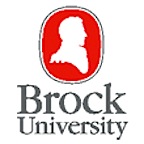
Brock University 8 to 19 July 2002
"Cultural Constructions of Technology and Human Relations: Healthy and Unhealthy, Strange and Familiar Bodies"
Conference Organizers: Maureen Connolly and Thomas D. Craig
The Conference:
The symposium will offer a thematic focus on cultural constructions of technological and human relations, healthy and unhealthy, strange and familiar bodies. This focus will allow participants to explore complementary, contested, and ambiguous relations between technology and bodies as lived. This focus is especially relevant in light of current events which necessitate heightened security and medical screening, more precise understandings of bodily presentations and processes (e.g., gait, neurological and metabolic processes, disease states), more complex analysis of belief systems, cultural norms, conflict and consequences. The more we know about the body, the more mysterious it becomes, blurring the borders between familiar and strange, law and transgression,self and other.
The Conference Schedule:
Monday, July 8
Linda and Michael Hutcheon: "Plenary Session: A Visual Adventure"
Isaac Catt and Deborah Eicher-Catt: "Roundtable Discussion: Current Research in Communicology"
Stu Rothstein: "Back Survival for the Business Traveller: A Curious Phenomenology of Everyday Life"
Tuesday, July 9
Richard L. Lanigan: "Communicology: Past, Present, and Future"
Pia Kontos: "Roundtable Discussion: Agency and Alzheimer’s Disease"
Maureen Connolly and Tom Craig: "Experiential Workshop in Semiotic Choreology"
Wednesday, July 10
Eric Peterson: "A Performance of One Sort or Another: Story telling in Web Logs"
Isaac Catt and Deborah Eicher-Catt: "Report on the Course: Introduction to Communicology" [Workshop]
Thursday, July 11
Marilyn Evans: "The Pregnant Body and Modern Technology"
Diane Bergsma: "Experiential Learning in Women’s Studies: A Reflection on Content and Process"
Friday, July 12
Frank Macke: "Intersections of Psychoanalysis and Communicology"
Tom Craig and Maureen Connolly: "Roundtable Discussion: King Solomon and the Unbearable Rightness of Being (Communicology and the Embodied Politics of Interpretation)"
Fiona McMurran: "Privates on Parade: Phallic Interpretation in Ancient Athens"
Monday, July 15
Richard L. Lanigan: "Plenary Session: Reflections on Communicology"
Marion Zelinsky: "Roundtable Discussion: Painting and Merleau-Ponty"
Maureen Connolly: "Experiential Session: Embodied Ananlysis of Static-Dynamic Tensions in Training/Conditioning Contexts"
Tuesday, July 16
Jackie Martinez: "Rhetoric, Semiotics, and Racist Exclusions: A Phenomenology of Transforming Racisms"
Maureen Connolly: "Bikini Bytes: A Communicology of Front Stage and Back stage Performances at competitive Bodybuilding Events"
Lisa Anderson: "Experiential Workshop: Theater"
Wednesday, July 17
All Participants: "Open Roundtable to Reflect on Presented Papers and Workshop Experiences"
Maureen Connolly: "Experiential Workshop: Social Dance Taught/Learned through Lived Body Theorizing"
Thursday, July 18
Frank Macke: "Intersections of Psychoanalysis and Communicology: Revisited"
Keith Johnston: "Roundtable Discussion: Disability Studies and Hidden Curriculum"
Glenys McQueen-Fuentes: "Experiential Session: Movements in Teaching and Learning: Freeing Up Our First Language"
Friday, July 19
Tom Craig and Maureen Connolly: "Ritual Process and Social Drama in the Bible and the University: The Trial of the Unfaithful Member"
Richard L. Lanigan: "Roundtable Discussion: Conclusions and Thematics of the Second Summer Seminar"
Group Field Trip: Niagara Falls (Canadian Side)
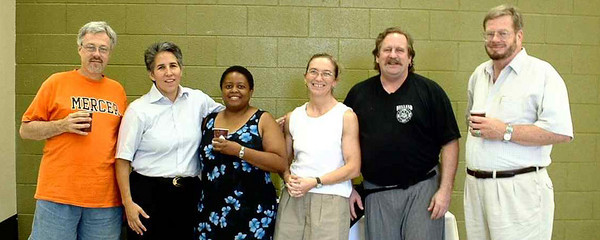
Some of the Participants (from left): Frank Macke, Jackie Martinez, Lisa Anderson, Maureen Connolly, Tom Craig, Richard Lanigan
 2004 Third Summer Symposium U.S.A. (Bemidji, Minnesota)
2004 Third Summer Symposium U.S.A. (Bemidji, Minnesota)
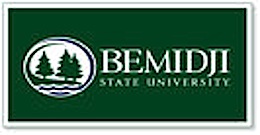
Bemidji State University 19 to 23 July 2004
"Signs, Signing, Signage"
Conference Organizer: Carol A. Richards
The Conference:
SIGNS:
The ICI invites scholars and developing scholars to join usas we pursue our interests in signs and semiotics. Papers and presentations in any field of study are welcome. Fellows of the Institute will share their research in human communication.
SIGNING:
Stephen McKasson, Document Examiner, and an invited guest of the ICI, will present his study of identity and identification, particularly from the point of view of forensic science. Interested scholars may contribute to the study with their research on identity.
SIGNAGE:
Pamela Maas, Human Factors Psychologist, will introduce her specialty to attendees. Phenomenologists may wish to relate her study of human factors to the concept of embodiment. Signage is just one area of study within human factors research.
The Conference Schedule:
Monday, 19 July
Art Lee: "Local Lore"
Lee Cook: "Tribal View"
Richard L. Lanigan: "Aberrant Signs in Hypercode Transformations"
Pamela Maas: "The Nature of Human Factors Research"
Tuesday, 20 July
Isaac Catt and Deborah Eicher-Catt: "Roundtable: Breakfast with Bateson" (Session 1)
Marian Zielinski: "Human/Nature"
Tom Craig: "Shelter on the Mountain of God"
Frank Macke: "Embodiment: Thematics of Anxiety, Questions of Agency"
Vicki Magee: "The Poetics of Written Communication: DeBold and Gilligan’s Self-Poem as an Analytic Tool"
Wednesday, 21 July
Isaac Catt and Deborah Eicher-Catt: "Roundtable: Breakfast with Bateson" (Session 2)
Lennart Nørreklit: "Philosophy of Love"
Maureen Connolly: "Operationalizing Semiotic Choreology"
Richard L. Lanigan: "Methodological Applications of the Nonce Sign"
Thursday, 22 July
Isaac Catt and Deborah Eicher-Catt: "Roundtable: Breakfast with Bateson" (Session 3)
Steven McKasson: "Novel Evidence"
Carol Richards: "Communicological Pedagogy: The Giemas Semiotic Square as a Teaching/Learning Tool"
Group Field Trip: Itasca State Park; Headwaters of the Mississippi River.
Friday, 23 July
Stephen McKasson: "Identification"
Pia Kontos: "Furnishing a Primordial Foundation for Habitus"
Pamela Maas: "The Human Factors of Signage"
Yun Xia: "We Are Digitized Long before We Have Computers: Analog and Digital Communication"
Tom Craig and Maureen Connolly: "Semiotic Phenomenology/Choreology of Religious Commitment"
All Participants: "Roundtable: Last Words in the Sign System of Human Communication"
 2006 Fourth Summer Symposium DENMARK (Aalborg and Skagen, North Jutland)
2006 Fourth Summer Symposium DENMARK (Aalborg and Skagen, North Jutland)
![]()

CASSIRER SEMINAR
Centre for Philosophy and Science Studies, Aalborg University
"Language Beyond Power" 26 June to 1 July, 2006
Conference Organizer: Lennart Nørreklit
The Conference:
Communication in and beyond the concept of power with particular reference to Ernst Cassirer’s work on culture and communication. The visibility of language seems to make it apolitically and scientifically controllable instrument. Consequently life world communication develops forms of language and communication to create social meaning that evade the systems of observation and control. Is communication prior to science, power and control? Is the intelligence of communication the most advanced intelligence? Is communication always able to develop forms of language that penetrate beyond power and scientific control? Subtopics include amongst others:
Art, Communication and Power
Deconstruction of Language by Power
Science and Communication Beyond Power
The Power of Art and Symbolic Communication
Autonomous Connection to the World
Creating Freedom
Hidden Worlds
Seminar Thematic:
A primary function of the seminar is to produce a book collection of papers to be published under the title Cassirer on Communicology. A primary theme of the book is to explicate Cassirer’s use of semiotic phenomenology as a research methodology. While seminar papers are not required to utilize the work of Cassirer, those that do will be reviewed for inclusion in the book. Cassirer’s key concepts are expression [Ausdruck], representation [Darstellung], and signification [Beutung], with expression specified as mimetic, analogical, and symbolic. Cassirer’s main categories of research are (1) Myth, (2) Language, (3) Art, and (4) Knowledge as a function of the phenomenology of Culture.
The Conference Venue:
The conference venue will be the conference center at Skagen, North Jutland operated by Aalborg University. The conference center is the Klitgaarden Refugium restored and opened in 2000. The former summer "cottage" of King Christian X, the original building has been restored with guest accommodation, kitchen, dinning room, conference room, computing facilities, and sits on a beach facing the Skagen town and harbor.
The Conference Schedule:
